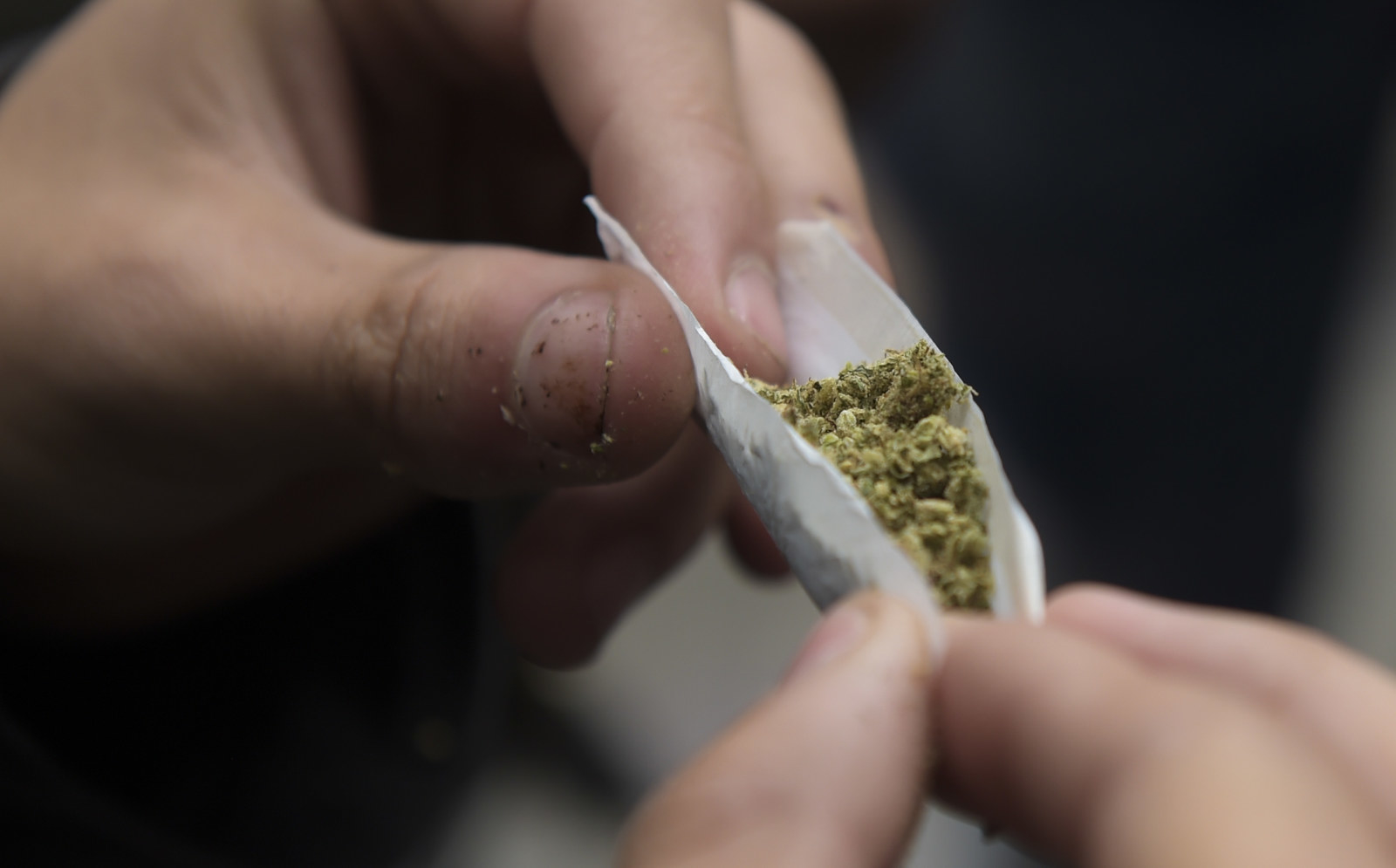A rare reaction to marijuana called cannabinoid hyperemesis syndrome can cause severe vomiting and make you too ill to eat.
Lauren Strapagiel
Cannabis has long been used as a treatment for nausea, but for some people it has the opposite effect, with devastating results.

Desiree Haight
Desiree Haight, who lives in Calgary, Canada, has been smoking pot for a good chunk of her 46 years. She doesn't use marijuana every day, but if she's home, she might go through a few grams.
Medically, you could call her a chronic user.
It was enough of a part of her life that when she developed crippling nausea and relentless vomiting, she had no reason to think pot was the problem.
The first time it got really bad was in 2005, Haight told BuzzFeed News. The nausea was overwhelming.
"It just grips you like fog — there’s no way out of it," she said. "You retch probably 30, 40 times a day minimum."
The vomiting was very particular, accompanied with a deep, guttural sound.
"It's kind of like a scream and a vomit together. It doesn’t really stop."
She ended up hospitalized for three months and lost so much weight she was down to just 96 pounds.
Medically, you could call her a chronic user.
It was enough of a part of her life that when she developed crippling nausea and relentless vomiting, she had no reason to think pot was the problem.
The first time it got really bad was in 2005, Haight told BuzzFeed News. The nausea was overwhelming.
"It just grips you like fog — there’s no way out of it," she said. "You retch probably 30, 40 times a day minimum."
The vomiting was very particular, accompanied with a deep, guttural sound.
"It's kind of like a scream and a vomit together. It doesn’t really stop."
She ended up hospitalized for three months and lost so much weight she was down to just 96 pounds.
The doctors didn't really know how to stop her symptoms. They gave her a feeding tube and information about eating disorders, but Haight knew that wasn't the issue.

Desiree Haight
"They basically said I was crazy at the end of it. They said I was stuck in a fight-or-flight loop," she said.
Stranger still was that only hot showers brought relief of her symptoms. She said she'd find herself crawling to the shower, barely able to function.
"The only thing that makes you feel better is hot water," she said. "As soon as that hot water hits you, it’s over, you could run a marathon."
Last November, Haight found herself in the hospital once again with her mysterious illness.
"The first thing is the doctor asked [was] do hot showers bring me relief," she said. He also asked if she smoked cannabis.
And the doctor knew right away what he was dealing with.
Stranger still was that only hot showers brought relief of her symptoms. She said she'd find herself crawling to the shower, barely able to function.
"The only thing that makes you feel better is hot water," she said. "As soon as that hot water hits you, it’s over, you could run a marathon."
Last November, Haight found herself in the hospital once again with her mysterious illness.
"The first thing is the doctor asked [was] do hot showers bring me relief," she said. He also asked if she smoked cannabis.
And the doctor knew right away what he was dealing with.
Haight finally got her diagnosis — cannabinoid hyperemesis syndrome.

Raul Arboleda / AFP / Getty Images
Dr. Joseph Habboushe, a clinical associate professor of emergency
medicine at NYU Langone Health in New York, happens to study this
condition. (Although he didn't treat Haight.)
He told BuzzFeed News that the pot-related condition has symptoms that include recurring bouts of terrible nausea, vomiting, and cramps. The name, cannabinoid hyperemesis syndrome, essentially means cannabis vomiting syndrome.
Doctors are usually able to diagnosis it by the patient's history with cannabis use, particularly if hot water helps relieve the symptoms.
"People will start taking hours of hot showers a day, they get out of the shower, they feel terrible, they get back in," he said.
The constant hot showers and vomiting can contribute to dehydration and malnutrition, which make people even sicker.
"A large percentage of these patients will become so dehydrated they start getting a type of renal [kidney] failure," he said.
Like Haight, Habboushe said patients don't tend to connect their cannabis use to their symptoms because it seems so counterintuitive. He also noted this illness happens in heavy users who've been smoking over a long period of time. Having a joint once and feeling nauseous is something else entirely, and most likely not cannabinoid hyperemesis syndrome, he said.
There's still not that much that's known about what causes cannabinoid hyperemesis syndrome, and how common it actually is. Habboushe said that it does seem that more people are being diagnosed with it as cannabis becomes legal in many areas, the availability is increasing, and the taboo against using it fades.
One 2018 study conducted by Habboushe and colleagues estimated that roughly 2.75 million people in the US might have symptoms compatible with cannabinoid hyperemesis syndrome.
The only treatments available are hot showers and baths, or sometimes patients are prescribed capsaicin cream, which is made with hot peppers. This seems to mimic the relief of hot showers. To really fix it, though, a patient has to stop using cannabis, Habboushe said. But that can be tough for some chronic users.
"A lot of them, especially the ones who get it severely, they really don’t want to stop," said Habboushe. "There’s a lot of denial."
It's also known that this is a recurring illness and it seems to be permanent.
"If you’re starting to get these symptoms, slow down before you become someone who’s so severe you can never smoke again," he said.
He told BuzzFeed News that the pot-related condition has symptoms that include recurring bouts of terrible nausea, vomiting, and cramps. The name, cannabinoid hyperemesis syndrome, essentially means cannabis vomiting syndrome.
Doctors are usually able to diagnosis it by the patient's history with cannabis use, particularly if hot water helps relieve the symptoms.
"People will start taking hours of hot showers a day, they get out of the shower, they feel terrible, they get back in," he said.
The constant hot showers and vomiting can contribute to dehydration and malnutrition, which make people even sicker.
"A large percentage of these patients will become so dehydrated they start getting a type of renal [kidney] failure," he said.
Like Haight, Habboushe said patients don't tend to connect their cannabis use to their symptoms because it seems so counterintuitive. He also noted this illness happens in heavy users who've been smoking over a long period of time. Having a joint once and feeling nauseous is something else entirely, and most likely not cannabinoid hyperemesis syndrome, he said.
There's still not that much that's known about what causes cannabinoid hyperemesis syndrome, and how common it actually is. Habboushe said that it does seem that more people are being diagnosed with it as cannabis becomes legal in many areas, the availability is increasing, and the taboo against using it fades.
One 2018 study conducted by Habboushe and colleagues estimated that roughly 2.75 million people in the US might have symptoms compatible with cannabinoid hyperemesis syndrome.
The only treatments available are hot showers and baths, or sometimes patients are prescribed capsaicin cream, which is made with hot peppers. This seems to mimic the relief of hot showers. To really fix it, though, a patient has to stop using cannabis, Habboushe said. But that can be tough for some chronic users.
"A lot of them, especially the ones who get it severely, they really don’t want to stop," said Habboushe. "There’s a lot of denial."
It's also known that this is a recurring illness and it seems to be permanent.
"If you’re starting to get these symptoms, slow down before you become someone who’s so severe you can never smoke again," he said.
As for Haight, she quit smoking pot as soon she was diagnosed.

Desiree Haight
Still, it took a month and a half to recover from the symptoms she
had in November. A lot of that hard work was just trying to recover her
appetite and make herself eat, she said.
"You can stop the weed but to get eating again is a nightmare, but you’ve got to do it," she said.
As for the cannabis, giving that up was much easier.
"For me, I’ve smoked enough in my lifetime to last me a lifetime."
"You can stop the weed but to get eating again is a nightmare, but you’ve got to do it," she said.
As for the cannabis, giving that up was much easier.
"For me, I’ve smoked enough in my lifetime to last me a lifetime."

No comments:
Post a Comment